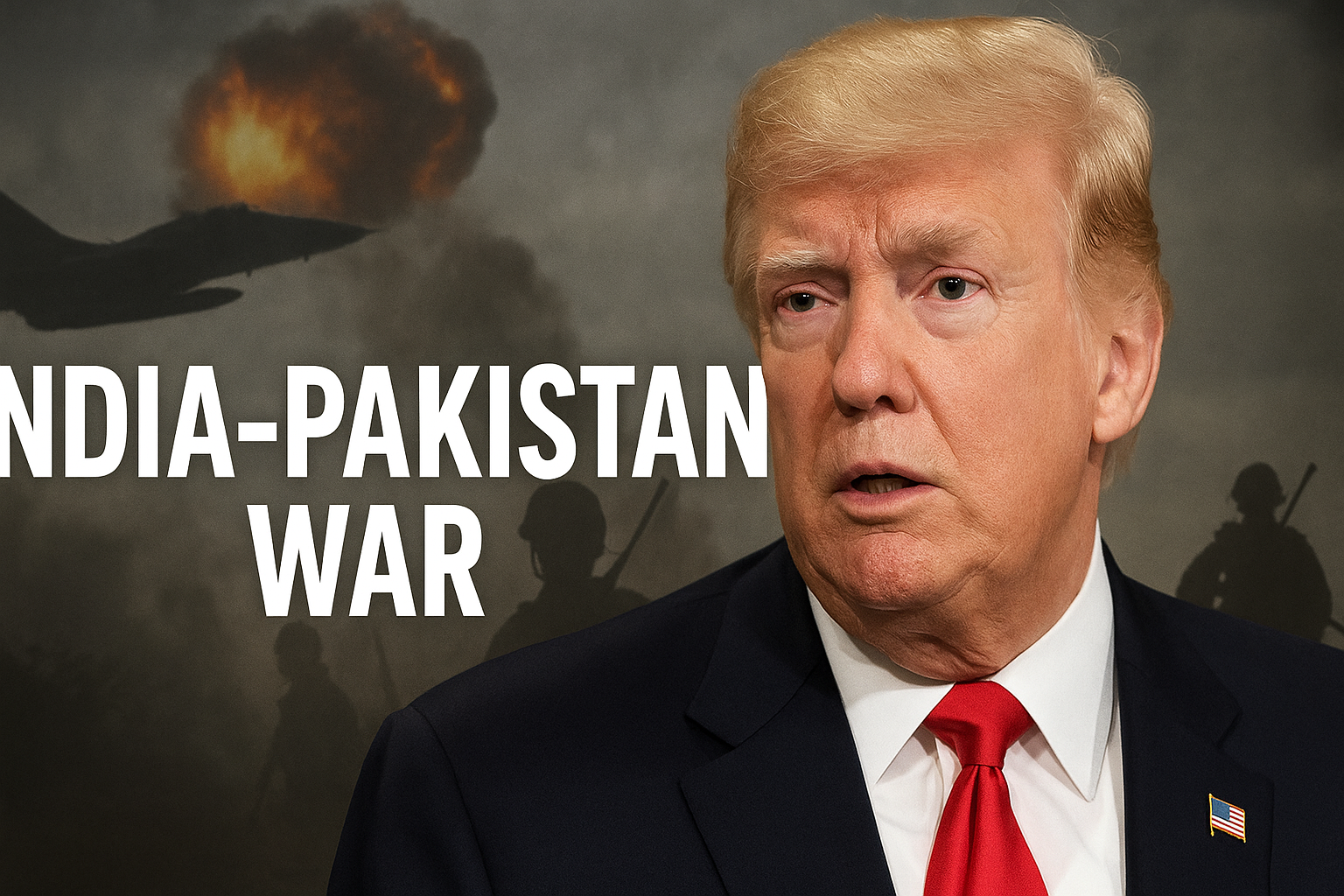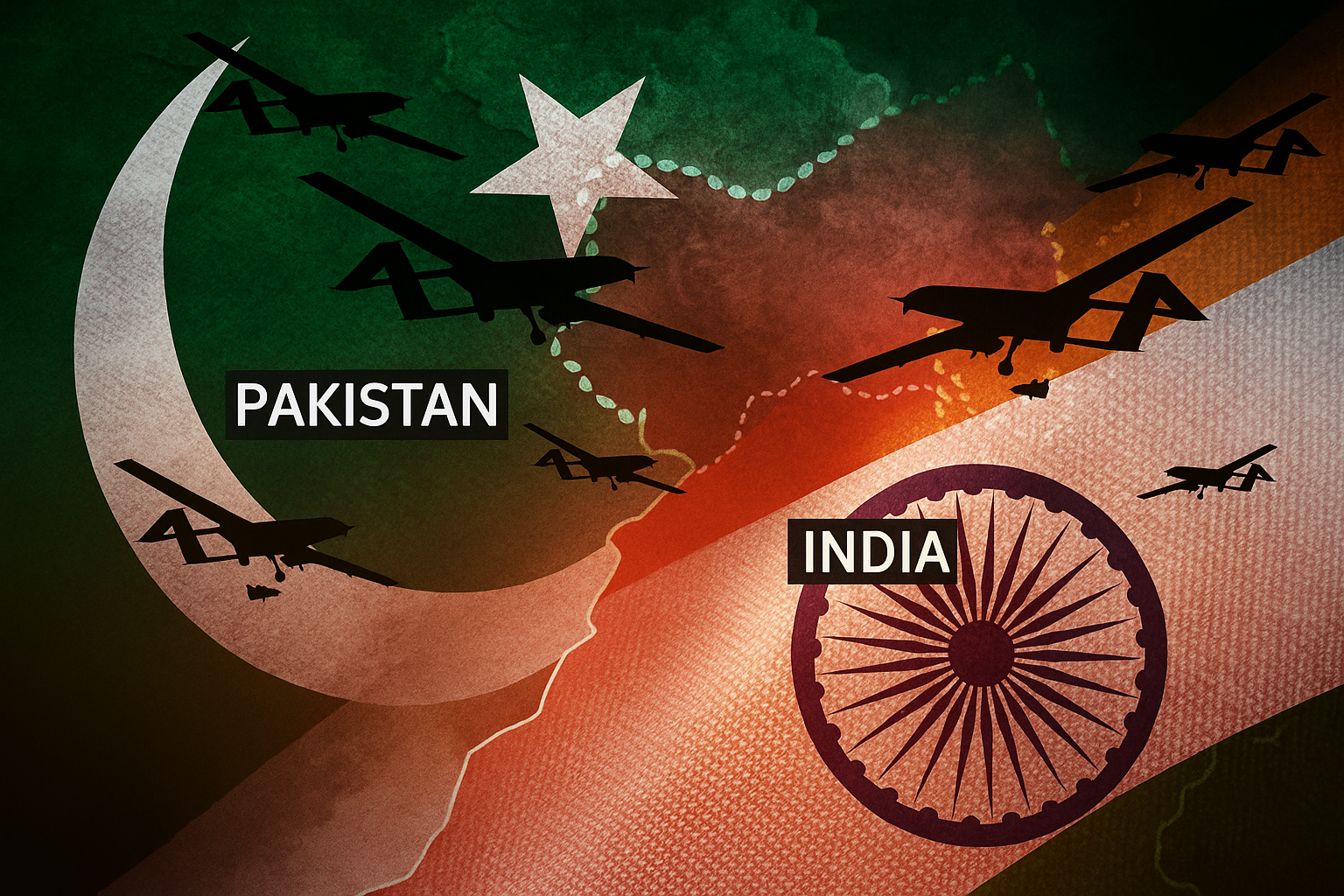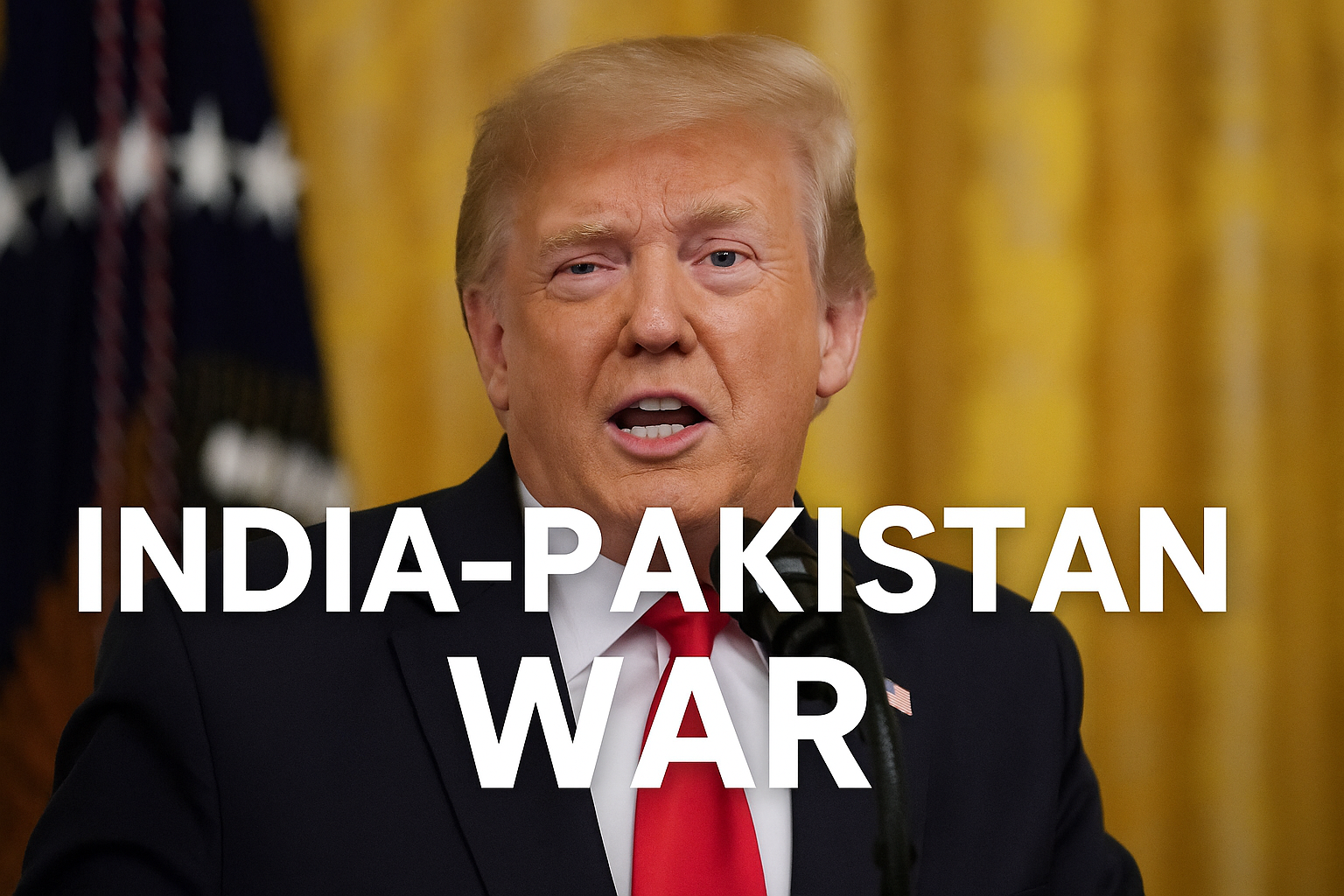Donald Trump Revives India-Pakistan War Claims: Takes Credit, Sparks Global Controversy

In a dramatic turn of rhetoric, former U.S. President Donald Trump has once again stirred geopolitical debate by claiming credit for preventing an all-out “India-Pakistan War” during his time in office.
His statements, delivered during a campaign-style address, have reignited discussions across diplomatic circles, with both positive and negative reactions pouring in from global audiences.
This is not the first time Trump has asserted involvement in defusing tensions between the two South Asian nuclear powers. But his recent comments have intensified scrutiny, especially with his controversial assertion that “five fighter jets were shot down” during the skirmish.
As global leaders react and experts dissect the implications of his remarks, the spotlight once again falls on the delicate balance of diplomacy between India and Pakistan.
Trump’s assertion, while politically charged, reflects his strategy of portraying himself as a decisive leader on international matters.
His repeated focus on the “India-Pakistan War” theme not only brings attention to past conflicts but also risks reopening old wounds.
For many South Asians, especially those who have lived through past wars or lost loved ones to border skirmishes, such statements can feel deeply insensitive.
The timing of Trump’s comments is also significant. With global elections approaching and U.S. politics heating up, his efforts to project strong international leadership are clearly aimed at rallying his base.
However, these claims have the potential to influence diplomatic relationships, especially at a time when India and the U.S. are strengthening ties in technology, defense, and trade.
Trump’s Shocking Claim on India-Pakistan War
During his speech, Donald Trump boldly declared that he had stopped an imminent “India-Pakistan War” that could have turned catastrophic.
According to Trump, both nations were “ready to launch” major offensives before his intervention.
“They were going at it. It was going to be a big war. They were calling me constantly. I stopped it,” Trump said, adding that the conflict had already seen five jets taken down — a claim that aligns more closely with Pakistani narratives than with India’s.
The “India-Pakistan War” focus has always been a sensitive topic, especially considering the historical tensions following the Pulwama attack in February 2019 and India’s retaliatory Balakot airstrikes.
While both nations maintain official versions of the events, Trump’s new claim about five jets being shot down seems to embellish or challenge existing military records.
India officially confirmed the loss of one MiG-21 Bison while claiming it downed a Pakistani F-16, whereas Pakistan has consistently denied losing any F-16.
Trump’s declaration added another layer of complexity to the already tense regional narrative.
His characterization of a near full-blown “India-Pakistan War” is not only diplomatically charged but also historically provocative.
Political commentators argue that even if his administration did play a role in preventing further escalation, his portrayal of the event grossly oversimplifies and dramatizes a highly sensitive geopolitical episode.
In South Asia, where memories of conflict still resonate across generations, the term “India-Pakistan War” carries heavy emotional and political weight.
Any mention of war, especially by a former world leader, is enough to trigger debates and concerns — not just within governments but also among citizens who fear renewed conflict.
Trump’s comments have, unsurprisingly, sparked headlines in major newspapers across the subcontinent.
Diplomatic Circles React to India-Pakistan War Comments
Trump’s statement, coming during a politically charged campaign rally, has raised eyebrows among diplomatic experts and regional analysts.
For many, it feels like a dangerous simplification of a historically complex issue.
Experts from both the U.S. and India argue that such remarks, while politically potent for domestic American audiences, could inflame nationalist sentiments and rekindle long-settled tensions.
The Indian Ministry of External Affairs has not officially commented on Trump’s latest remarks. But sources say that the government considers them “unsubstantiated and diplomatically irresponsible.”
Conversely, some Pakistani officials have seen Trump’s comments as validation of their position during the 2019 military standoff, where they claimed greater aerial success.
The “India-Pakistan War” term itself is politically loaded.
Technically, there has been no declared war since the Kargil conflict in 1999. But multiple military skirmishes, ceasefire violations, and cross-border attacks have kept the region volatile.
Trump’s use of the term in such a casual manner is being seen as both a political strategy and a diplomatic misstep.
By amplifying the “India-Pakistan War” rhetoric, Trump may inadvertently strain ties with India — a nation that has grown closer to the U.S. in terms of defense and economic cooperation.
Analysts are concerned that Trump’s speech could damage years of painstaking diplomatic progress.
India and the U.S. have cultivated strong strategic ties. Statements such as these, without context or corroboration, risk undermining mutual trust.
Furthermore, foreign policy analysts have warned that this isn’t just a slip of the tongue.
The repeated use of “India-Pakistan War” by Trump could be part of a calculated narrative aimed at solidifying his image as a global power broker.
However, such rhetoric can deeply impact how India and Pakistan view American neutrality in regional disputes.
Countries in conflict zones often look to global powers for balanced intervention, not dramatized campaign fodder.
Five Jets Downed? Fact or Fiction in India-Pakistan War Narrative

Perhaps the most controversial aspect of Trump’s speech was his mention of five jets being shot down during the “India-Pakistan War” standoff.
Analysts have been quick to point out that this figure does not align with any known public or military record.
Indian officials confirmed the loss of Wing Commander Abhinandan Varthaman’s jet but also claimed an F-16 kill in return — a claim that remains disputed.
Trump’s use of the “India-Pakistan War” label for what was effectively a three-day military escalation has prompted renewed debates about how misinformation and exaggerated statements from global leaders can impact international relations.
In an era of social media-driven politics, such claims often go viral, shaping public perception before facts can catch up.
American think tanks and South Asia analysts have also weighed in.
Michael Kugelman of the Wilson Center noted, “Trump’s narrative oversimplifies a deeply complex situation. His claim that five jets were downed and that he personally stopped the India-Pakistan War may resonate with his base, but it undermines the credibility of nuanced diplomacy.”
This exaggeration could have serious consequences.
For instance, such claims may embolden hardliners in both India and Pakistan who view these types of statements as tacit endorsements of aggression.
The delicate diplomatic process that both nations engage in requires a high degree of discretion and factual accuracy.
Any deviation can escalate into full-scale conflict.
Critics also note that Trump’s narrative diminishes the diplomatic efforts made by actual officials and leaders on both sides.
It’s not uncommon for high-ranking diplomats, intelligence agencies, and defense officials to work behind the scenes during military stand-offs.
To claim that one phone call prevented the “India-Pakistan War” overshadows the months of backchannel communication, restraint, and coordination that went unnoticed by the public.
Historical Precedents and Impact on India-Pakistan War Memory
Trump’s claim has once again drawn attention to a long and complex history between India and Pakistan.
Since their partition in 1947, the two nations have fought several wars — notably in 1947, 1965, 1971, and 1999.
The India-Pakistan War narrative has deeply influenced political rhetoric, military planning, and public consciousness in both countries.
In this context, any suggestion of a thwarted war — especially by an external actor — invites scrutiny.
While it’s true that international pressure, including from the U.S., played a role in de-escalating tensions post-Pulwama, Trump’s solo claim of resolution omits the efforts of Indian and Pakistani leadership, as well as third-party actors such as the United Nations and regional players like China and Russia.
The legacy of each India-Pakistan War is marked by loss, resilience, and nationalistic revival.
In India, the Kargil War anniversary is observed annually with somber pride.
In Pakistan, Defense Day commemorates military achievements.
These events have cemented the conflicts as enduring narratives of sovereignty and sacrifice.
Trump’s attempt to position himself as the central figure in preventing a modern-day India-Pakistan War risks trivializing this shared history.
Media Reactions and Public Sentiment Around India-Pakistan War Remarks
As expected, Indian and Pakistani media outlets responded strongly to Trump’s remarks.
Leading Indian publications described his statements as “grossly misleading,” while others urged the government to issue a formal response.
In Pakistan, however, media coverage was more nuanced.
Some editorials hailed Trump’s comments as a tacit endorsement of Islamabad’s stance, while others warned against overreliance on foreign validation.
On social media, the reactions were mixed.
Hashtags such as #IndiaPakistanWar and #TrumpControversy trended across Twitter and Facebook.
Memes, critical essays, and fact-checking posts flooded digital platforms, with users from both nations engaging in spirited debate.
Many accused Trump of exploiting sensitive geopolitical issues for electoral gains.
Indian defense analysts and former diplomats appeared on prime-time television to clarify the sequence of events during the 2019 standoff.
Their goal: to present an accurate record and avoid further escalation.
Pakistani commentators, meanwhile, discussed the opportunity to highlight their narrative internationally.
It became clear that Trump’s India-Pakistan War reference had reignited more than just political tension — it reopened wounds of identity and historical memory.
Conclusion: Consequences of Politicizing the India-Pakistan War
As Trump continues his campaign trail and reasserts his foreign policy credentials, his remarks about the India-Pakistan War are likely to resurface.
While it may win him points among certain voter demographics in the U.S., the cost to international diplomacy could be significant.
Reducing complex geopolitical tensions to soundbites risks not only misleading the public but also endangering future peace efforts.
In the realm of global politics, words matter.
And when those words involve the possibility of an India-Pakistan War — with its nuclear implications and historical baggage — the stakes are too high for misinformation.
Leaders across the world, regardless of political affiliation, must tread carefully when invoking war.
Because for millions living in the subcontinent, war isn’t a talking point. It’s a lived reality that should never be repeated.
As the world watches, the question remains: Will such rhetoric fade as campaign noise, or will it leave a lasting impact on how future India-Pakistan War narratives are shaped?

